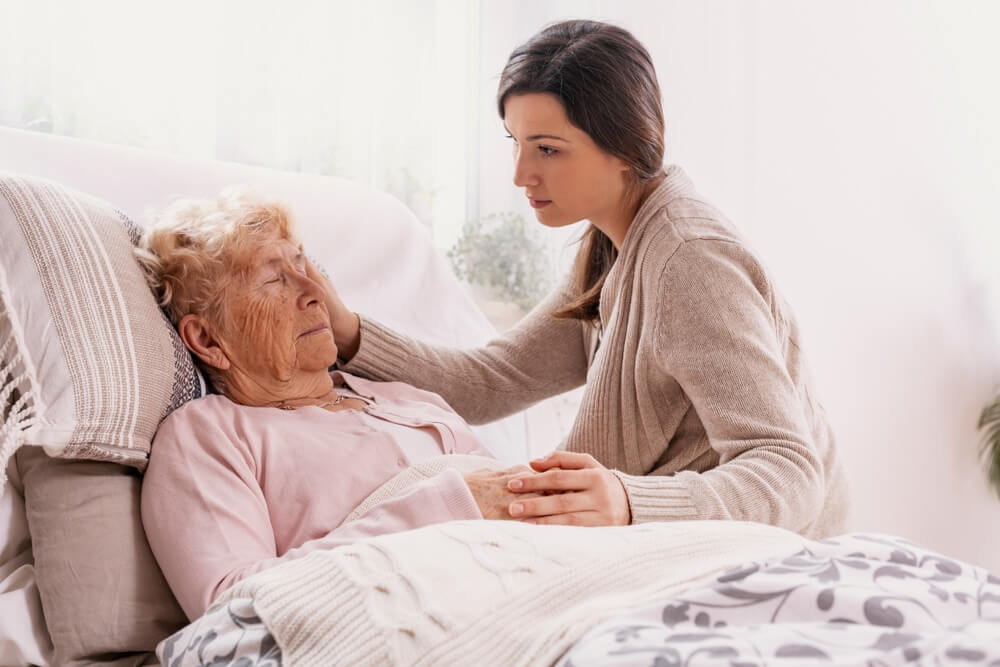The last stage of dementia is also known as advanced dementia or end-stage dementia. It is the stage where the symptoms of dementia become severe, and a person faces issues performing everyday activities. Knowing about the various stages of dementia allows you to provide sufficient care to your loved ones.
A person going through the last stage of dementia might have difficulties moving, along with other medical complications. Developing pneumonia or a urinary tract infection (UTI) is common in such cases. Some also face blood clots, bedsores, and skin breakdown.
Patients have trouble eating, swallowing, and drinking, which leads to weight loss, malnutrition, and dehydration, thereby increasing the risk of contracting infections. Dying from dementia in the end stage occurs due to underlying dementia or an associated complication.
Those who have dementia could die from aspiration pneumonia. It is because when they have difficulty swallowing, the liquids and food items could go down the wrong tube in their system. Therefore, instead of traveling into the stomach or esophagus, they are breathed into the lungs or airways.
Since dementia affects a person’s ability to move, they become bedridden, which leads to the development of blood clots in their lungs, eventually leading to death. Therefore, being aware that end-stage dementia is a terminal illness is imperative for the family of the patient.
Table of Contents
How to Manage Late-Stage Dementia
The last stage of dementia can either be short or go on for quite a long time. In such cases, it becomes important for the patient’s family to know how to look after their loved one. Here are some ways in which you can handle someone who has end-stage dementia:
Set Up Your Home
A person with dementia could be bedridden for years, so you need to set up your home properly so that neither the patient nor the caretaker gets injured. Get a hospital bed so you can adjust its height accordingly. Consult a doctor before buying a mattress that suits the patient’s needs.
The mattresses to buy in such situations include a waterbed or an air mattress. Bedridden individuals could develop pressure ulcers or bedsores, and such mattresses handle the pressure points to stop a patient from developing pressure sores.
If the patient is not bedridden, getting them a walking stick or a wheelchair is wise. It’s also advised to look into assistive devices, such as folding bed trays and shampoo basins.
Develop Support Systems
Getting adequate support systems is crucial for a person with late-stage dementia. Access to home healthcare services aids in getting attendants and physiotherapists to your home, along with nurses who take care of IVs and injections.
Remember that you can’t rely on just one app or service because they could close down or withdraw their services. Get in touch with multiple home care service providers so that you can call a doctor’s home whenever necessary.
Keep the phone numbers of ambulance services nearby at all times. Also, it’s better to keep a hospital bag ready in case of emergencies, with the bag containing medicines, insurance papers, and other medical documents.
Read Up About Home-Nursing
Looking after a bedridden person with late-stage dementia means feeding them, cleaning after them, bathing them, and helping them do their exercises. This is why reading up about home nursing can prove helpful.
While some patients can convey when they need to use the toilet, others could end up having incidents such as bedwetting. Therefore, get diapers and a bedsheet that has waterproof sheets underneath.
Stay Alert
While daily health checkups from doctors are useful, you need to stay alert while living with an older person who has dementia. As discussed previously, getting a suitable mattress is one of the first steps in this department. Keep turning the person every couple of hours to prevent them from getting bedsores.
Since bedridden people hold a position for too long, it could stiffen their muscles. Therefore, open their hands and straighten their legs at frequent intervals. Ensure that the bedsheets are wrinkle-free, and consult the doctor about how to look after the patient’s skin.
Conclusion
As a person’s dementia advances and reaches the last stages, there is not much one can do to save them. However, taking care of them and being active as their caretaker is something that can be done anytime.
Take the patient to reputed nursing homes that are known to treat people with late-stage dementia.
Please ensure that their symptoms are looked into and that they receive care that relieves their pain as much as possible.

